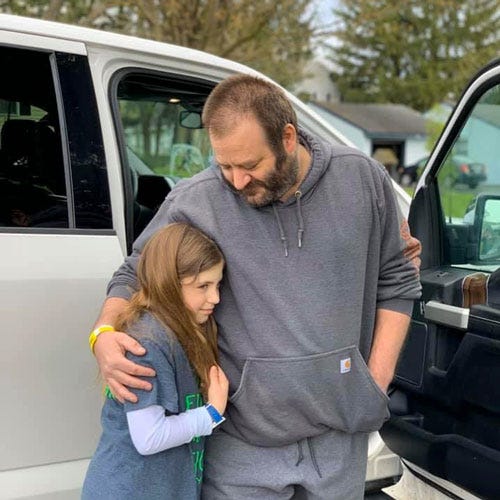May 7 was a great day for Travis Duffy and his family. It was the day that he was finally reunited with his 8-year-old daughter and his newborn son.
After one month in a Syracuse hospital fighting COVID-19, Duffy finally was able to come home.
"It was scary for sure and a long road. It's been a battle," he says.
At 39 and with no underlying health conditions, Duffy doesn’t necessarily fall into the category of an “at-risk” COVID-19 patient. According to the Centers for Disease Control and Prevention, older adults and people of any age who have serious underlying medical conditions are at higher risk for severe illness from the virus.
Duffy, though, was unlucky. He runs the heifer raising operation at Curtin Dairy in Cassville, N.Y., and still doesn’t know how he contracted the virus. One thing is for sure, though: It came on quickly and with little warning.
“Towards the first week of April I just ended up feeling really crappy,” he says. He went to a local urgent care facility and was tested for the flu and COVID-19.
Over the course of two days he had to cut back on his farm work. On the second night his fever got up to 104 degrees F and he couldn’t sleep.
A local nurse he knows who used to be a farmer urged him to go to the hospital. He drove 40 minutes to Upstate University Hospital in Syracuse. His urgent care test came back positive for COVID-19.
Within 12 hours he had developed symptoms of sepsis and was put on a ventilator.
His doctors told him he only had a 10% chance of getting off the ventilator. Looking at a picture of his daughter, Aubrey, on his cellphone, Duffy told the doctors that he was going to “fight like hell” to get out of the hospital and get home. Then, things went dark.
For 14 days he was unconscious as doctors struggled to keep him alive. His family and friends set up a dedicated Facebook page, #TRAVSTRONG, to keep people updated on his condition. People in the community started wearing #TRAVSTRONG bracelets and shirts. Decals started appearing on the backs of pickup trucks and toolboxes.
He regained consciousness for a short period of time, but when he coughed hard a piece of his ventilator mouthpiece got caught in his throat. Nurses came rushing in; Duffy says that he gagged and pulled the ventilator out.
Pulling the ventilator out put him back three to four days in his recovery, he says.
Finally, on April 15, he got an injection of convalescent plasma, an experimental treatment that doctors use for only the most severe COVID-19 cases. His numbers started to improve, and things started looking up as the end of April neared. But he clearly didn’t feel like the same person.
“I lost every bit of muscle in my upper body,” he says.
Being in the hospital was painful for another reason. His girlfriend, Kilee, was 9 months pregnant. On May 4, Kilee gave birth to a healthy baby boy, Connor. Duffy couldn’t see his son being born even though he was in the hospital right next to where he was.
Kilee kept him updated by text messaging him and his nurses placed a big sign on his room window: “Congratulations.”
Three days later, Duffy got the news that he was being discharged. While his doctors and nurses wanted to wheel him out, he insisted on walking out on his own. With nurses and other hospital staff cheering him on, Duffy walked out of the hospital and into the arms of his family and friends.

TEARFUL REUNION: Before heading home, Duffy stopped to surprise his 8-year-old daughter, Aubrey, whom he hadn’t seen for more than a month.

He then had a surprise for a special lady in his life. His dad drove him to see his daughter, Aubrey, for the first time in more than one month.
“She didn't even know I was coming. She was really, really excited. She came running out," he says.
Finally, his father took him home to be reunited with his family, his girlfriend and, for the first time, he got to see his newborn son.
“It was pretty cool. Definitely the support I had, it was pretty amazing,” he says.
Hard recovery
It’s been a grueling recovery thus far. Three days a week he does physical therapy and twice a week he does occupational therapy. A nurse visits at least once a week.
He’s starting to catch up on emails, pay bills and other bookwork on the farm, but it will be a while before he gets back to doing physical work. He says that it kills him seeing planters and tractors driving by the house while he has to stay inside.
The farm he works at has taken extra precautions to make sure no one else gets sick. Two other farm employees contracted the virus and had only mild symptoms. All the employees are wearing masks, regular cleanings are being done, and there are boxes and boxes of gloves for people who need them.
“We’re just going the extra mile to make sure this doesn’t continue spreading,” he says.
Many conspiracy theories about COVID-19 and the government’s response to the virus are on social media. Even Duffy says that he has friends who think the pandemic is a lie or is being overblown by the government and media.
Having been at death’s doorstep, though, he says he wants people to take this virus seriously.
“The biggest thing about this, even if you start to feel sick, just go get tested,” he says. “I went through hell. It's no fun at all.”
Read more about:
Covid 19About the Author(s)
You May Also Like






